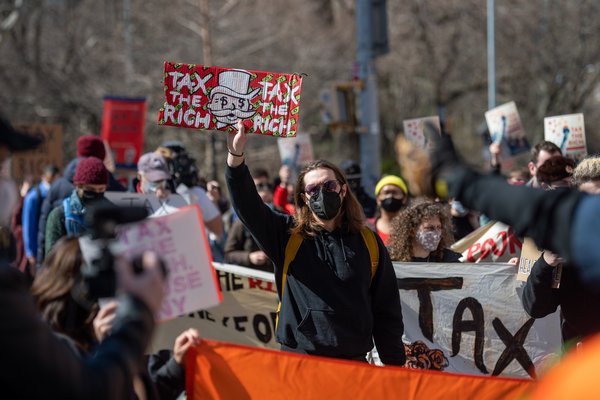Material World – Poverty and taxing the rich
 Oxfam regularly publishes reports about global poverty. Its most recent one points to how ‘the richest 1% have more wealth than the bottom 95% of the world’s population put together’. It accuses the ‘ultra wealthy and powerful corporations of tax dodging and exercising monopoly control of important products such as Covid vaccines to increase profitability’. As a result, it goes on, the pandemic has resulted in the emergence of at least 40 new vaccine billionaires. The charity complains that its efforts to reduce world poverty are being undermined by large corporations and the ultra-rich who, with their control over the global economy, are responsible for exacerbating problems like extreme inequality and climate change. In an interview with the Voice of America (VOA) radio network, Nabil Ahmed, director of economic and racial justice at Oxfam America, states: ‘The wealth of the world’s five richest men has doubled since the start of this decade. And nearly five billion people have got poorer’.
Oxfam regularly publishes reports about global poverty. Its most recent one points to how ‘the richest 1% have more wealth than the bottom 95% of the world’s population put together’. It accuses the ‘ultra wealthy and powerful corporations of tax dodging and exercising monopoly control of important products such as Covid vaccines to increase profitability’. As a result, it goes on, the pandemic has resulted in the emergence of at least 40 new vaccine billionaires. The charity complains that its efforts to reduce world poverty are being undermined by large corporations and the ultra-rich who, with their control over the global economy, are responsible for exacerbating problems like extreme inequality and climate change. In an interview with the Voice of America (VOA) radio network, Nabil Ahmed, director of economic and racial justice at Oxfam America, states: ‘The wealth of the world’s five richest men has doubled since the start of this decade. And nearly five billion people have got poorer’.
So what does this report, as well as others produced by Oxfam, advocate to tackle the problems it carefully documents and makes public? As often before, Oxfam puts emphasis on what it calls ‘fair taxes’. To be precise, it calls for ‘fairer taxation of large corporations and the ultra-wealthy’. In his VOA interview, Nabil Ahmed is quoted as saying: ‘We live in a world in which mega-corporations are paying next to or little to no tax’. They are, he says, ‘shaping the rules in their favour … at the expense of ordinary people’ and ‘fuelling inequality within and between countries’. He argues that governments should ‘claw back’ revenues from the rich ‘to be able to invest in their people, to be able to meet their rights’.
Superficially such an approach may seem sensible and desirable, and the Oxfam report praises a campaign proposed by Brazil’s government in favour of a 2 percent minimum tax on the world’s richest billionaires. This, it claims would raise up to $250 billion from around 3,000 individuals and would pay for food, healthcare, education and tackling climate change. However, this fails to consider several crucial factors. First of all, any ‘extra’ taxation money raised by governments from their capitalist class is just as likely to be used to pay off state debt as to help workers or to ease climate change. Then, more importantly, it will always be impossible for governments collectively to agree to universal tax levies, largely because they will all be looking to carry out their duty of encouraging ‘growth’ in their own country at the expense of other states and of supporting their own capitalist class at the expense of others. Nor is the capitalist system as a whole controlled by individual governments or by governments collectively, and disagreements easily break out between them as they seek to defend their own ‘patch’ in the world of competition and profit – something we see happening in many places right now.
It is no surprise, therefore, that, while the Brazil proposal apparently has the support of some countries, for example South Africa, France and Spain, it is opposed by others, including the United States, whose treasury secretary Janet Yellen stated at a G20 meeting last July: ‘Tax policy is very difficult to coordinate globally and we don’t see a need or really think it’s desirable to try to negotiate a global agreement on that’. So a solution along the lines suggested by Oxfam to tax the mega-rich and cancel debt burdens seems in fact little more than a well-meaning pipe dream.
And we can also see that, since the 1980s, when Oxfam changed its approach from being a mere money-collector to putting a lot more effort and resources into trying to offer explanations (if not always well founded) as to the causes of world hunger and deprivation, not a great deal has changed. Oxfam continues to devote considerable time and effort into proposing what it sees as explanations for the ills afflicting society, but, unfortunately, it still can’t come up with viable remedies. This is not for want of trying but because it fails to pinpoint the fundamental cause of those ills, which is that, in the system we live under, profit will in the end always trump need. And governments, no matter what their intentions, can never remedy that, since they are the system’s servants not its masters.
What is needed is a switch in perception, a new consciousness, not by the super-rich or governments but by the majority of those who have to sell our energies for a wage or salary – ie, most of us. This is a switch that will enable humanity as a whole to see the necessity of organising things differently, of using the resources of the whole planet sanely and rationally and in the interests of all its inhabitants – on the basis, that is, of a classless, worldwide society without frontiers which produces goods and services cooperatively and solely for human need not profit.
HKM
